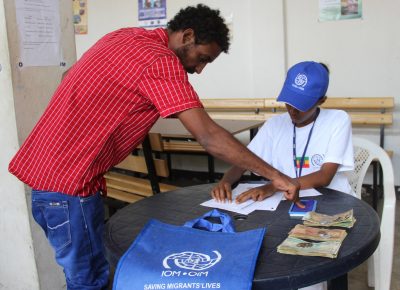By
Peter Louis
Many of the Ethiopian migrants travelled to South Sudan following the country’s independence in 2011. However, when war broke out on 15 December 2013, life became very unsafe. A large number of the migrants lived in Jonglei, Unity and Upper Nile states, where the conflict has been most severe.
Along with millions of South Sudanese, the migrants were displaced, lost livelihoods and were left with next to nothing. Some fled to UN protection of civilian (PoC) sites, while many travelled from conflict-affected areas of the country to the capital city of Juba and sought support from the Ethiopian community and humanitarian agencies, including the UN.
To assist the most vulnerable among this population, the International Organisation for Migration (IOM) worked closely with the Ethiopian Embassy in Juba to identify those in need of assistance to return home, including some requiring immediate medical assistance, as well as the elderly and minors.
In mid September, 13 of 30 recently identified vulnerable migrants returned to Ethiopia with IOM’s support, including Aster Genet, a 26-year-old Ethiopian.
“I lost my father when I was very young,” Aster explains, “and it was hard for me to get any job in Ethiopia to support myself and my family.” Upon hearing of opportunities in South Sudan, she undertook a long journey by road, assisted by brokers, to travel to the country in 2011. She was eventually left in Bentiu, the capital of South Sudan’s Unity State.
When the fighting broke out, Aster was forced to seek shelter at the UN PoC site in Bentiu, where living conditions are difficult. Due to insecurity in the area, those living in the site are reliant on the humanitarian community for assistance.
Now, Aster and many others have the opportunity to reunite with their families and resume an independent livelihood in Ethiopia.
The assistance was possible thanks to the support of the Government of Switzerland through the project “Provision of voluntary repatriation assistance ex-Egypt, Sudan and other countries in the Region.”
To date, IOM has assisted more than 700 migrants – from across the continent – caught in the crisis in South Sudan, which has displaced more than 2.26 million people. The organisation arranges evacuation flights for migrants stranded in remote, volatile and conflict-prone locations, as well as assisting with procedural work for travel permits and providing pre-departure medical screenings.



No Comments Yet!
You can be first to comment this post!